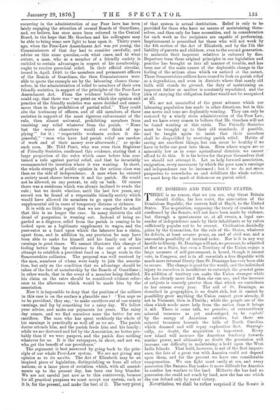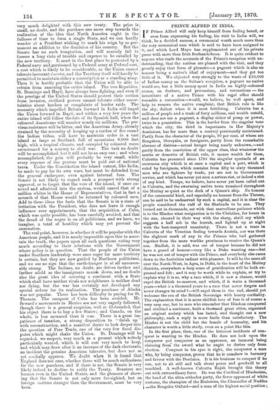ST. DOMINGO AND THE UNITED STATES.
TIT-FIRE is no reason, that we can see, why Great Britain should dislike, far less resist, the annexation of the Dominican Republic, the eastern half of Hayti, to the United States. The acquisition, supposing the treaty of cession to be confirmed by the Senate, will not have been made by violence, but through a spontaneous or, at all events, a legal sur- render of independence made by their inhabitants or by rulers sufficiently popular not to be overset. Civilization decidedly gains by the transaction, for the rule of the States, whatever its defects, at least secures peace, an and of civil war, and a reasonable possibility of internal order. Nor is it in any way hostile to liberty. St. Domingo will not, we presume, be admitted at first as a State, but even a Territory of the Union enjoys a large measure of self-government, is heard, though it cannot vote, in Congress, and is in all essentials a free Republic with much more internal liberty than St. Domingo has ever been able to secure. The change is good for the world, and the individual injury to ourselves is insufficient to outweigh the general gain,- No addition of territory can make the Union stronger while she has already more land than she can use, and the increase of subjects is scarcely greater than that which we contribute to her census every year. The soil of St. Domingo, as described in geographies, is no doubt rich, but it cannot by possibility grow anything the Union cannot grow already, if not in Vermont, then in Florida ; while the people are of the class which needs more help from the nation than it brings it aid. There is some talk, we perceive, of extraordinary mineral treasures as yet undeveloped, to be e.rploite' by the energy of American settlers, but there are mineral treasures beneath the hills of North Carolina which demand and will repay exploration first. Strategi-
cally, no doubt, the acquisition is important. Every new island will increase the American tendency towards marine power, and ultimately no doubt the possession will increase our difficulty in maintaining a hold upon the West India Islands. That hold, however, is not of the first import- ance, the fate of a great war with America could not depend upon them, and for the present we have one considerable compensation. We can fight most easily at sea, and every possession like Samana Bay makes it more difficult for America to confine her warfare to the land. Hitherto she has had no
ipossession she could not reach by land, now she has one which she can defend only by naval victory. Nevertheless, we shall be rather surprised if the Senate is very much delighted with this new treaty. The price is small, no doubt, and the purchase one more step towards the realization of the idea that North America ought in the fullness of time to form a single State, and we can hardly wonder at a President wishing to mark his reign by so per- manent an addition to the dominion of his country. But the Senate has no such temptation, and will scarcely fail to foresee a long vista of trouble and expense to be entailed by the new territory. It must in the first place be protected by a Federal navy and garrisoned by a Federal army at Federal cost, a cost which is likely to be considerable, as the Union cannot tolerate incessant eineutes, and the Territory itself will hardly be permitted to maintain either a conscription or a standing army. Then it is hardly probable that the Union will be able to refrain from annexing the entire island. The two Republics. St. Domingo and Hayti, have always been fighting, and even if the prestige of the United States should protect their section from invasion, civilized powers cannot tolerate either uncer- tainties about borders or complaints of border raids. The necessity which impelled Britain forward in India will impel the Union forward in Hayti, and within a very few years the entire island will follow the fate of its Spanish half, when the coloured Americans will number nearly six millions. The pre- vious resistance will be bitter, and the American Army, already strained by the necessity of keeping up a cordon of fire round the Indian tribes, will have to maintain order in a vast island as large as Scotland, full of mountains 8,000 feet high, with a tropical climate, and occupied by coloured races accustomed for a century to civil war. The task no doubt will be accomplished, but it will not be an easy one ; and when accomplished, the gain will probably be very small, while every expense of the process mast be paid out of national taxes. Under the Constitution the island cannot, like India, be made to pay for its own wars, but must be defended from the general exchequer, even against internal foes. The Senate is not likely to regard such a prospect with strong approval, or to forget that the vote of the island, if once an- nexed and admitted into the system, would cancel that of a million whites in the House of Representatives, that in fact a seventh of that House would be returned by coloured men. Add to these ideas the facts that the Senate is in a state of irritation with the President, who does not leave it enough influence over appointments, that the acquisition of Cuba, which was quite possible, has been carefully avoided, and that the dread of the negro is on all politicians, and we have, we imagine, a total of hostility which may yet prevent the annexation.
The real point, however, is whether it will be popular with the American people, and it is nearly impossible upon this to ascer- tain the truth, the papers upon all such questions voting very much according to their relations with the Government whose policy is in question. That the people of the Union under Southern leadership were once eager for more territory is certain, but they are now guided by Northern politicians, and we see no sign that the earth-hunger is at all unreason- ably strong. The Indians, no doubt, are driven farther and farther afield as the immigrants march down, and no doubt also the great idea of covering a continent with a State which shall have neither rivals nor neighbours is neither dead nor dying, but the war has certainly not developed any special ardour for its realization. The purchase of Alaska was not popular. There has been difficulty in paying for St. Thomas. The conquest of Cuba has been avoided. Mr. Seward's movements in Mexico are not very eagerly followed, though there is a general suspicion, well or ill-founded, that his object there is to buy a few States ; and Canada, on the whole, is less menaced than it was. There is a great im- patience of taxation, a strong disposition to "finish up" with reconstruction, and a manifest desire to look deeper into the question of Free Trade, one of the very few fiscal dis- putes which might shake the Union. St. Domingo will be regarded, we suspect, very much as a present which nobody particularly wanted, which it will cost very much to keep, and which may draw after it an increase of the dark electorate, an incident the genuine American tolerates, but does not as yet cordially approve. We doubt when it is found that England does not care, whether there will be much enthusiasm for the new purchase, and if there is not, the Senate is very likely indeed to decline to ratify the Treaty. Senators are human even in the United States, and the pleasure of show- ing that the Senate is not only more far-sighted, but on foreign matters stronger than the Government, must be very keen.



































 Previous page
Previous page